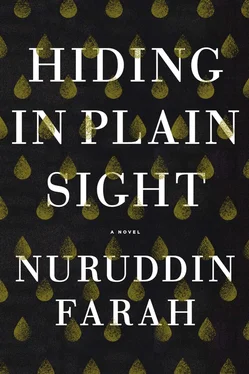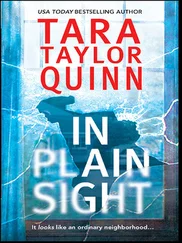Bella pulls off the road, stops the car, turns to Salif in the back, and says, “I’ll remind you again, my dear, of the promise you made to me earlier today that you would show patience, which you and I know would stand you in better stead in good and bad times.”
“My apologies, Auntie,” says Salif.
Dahaba says, “It’s okay, Auntie, he can’t help it.”
Despite not liking what Dahaba is doing, always speaking in protective defense of Salif whenever she tells him off, Bella makes no comment and gets back on the road, with Cawrala taking a few moments to come back on. A left turn, followed by a right turn and a long silence, leads her to think about her upcoming encounter with Valerie in an hour or so. And Bella discovers that she cannot dislodge a worry about whether she will tell Valerie that she is driving Aar’s car and then give her and Padmini a lift to the restaurant. Bella decides that it is unwise to complicate an uncomplicated situation; she won’t say much about the children at this first encounter, nor will she offer to drive them to the restaurant; let the damn women get to the rendezvous their own way. Bella decides she should be worrying about how she is going to make this thing get her to the hotel and back to where the children are. Having guided them to the drive-thru, Cawrala says, “We’ve arrived at your destination, to your right.”
The service is fast and Salif and Dahaba are happy with their respective orders. On the way back to their home, Bella, with Dahaba’s tutoring and Salif’s insistent encouragement, masters how to make the GPS function, including feeding in the street name of the hotel and Aar’s home address.
When they get back to the house, Bella goes upstairs, and having no other dress to change into, she brushes her hair, borrowing Dahaba’s comb, which she has to clean on account of the girl’s hair that is there from previous use. And before leaving for the hotel, Bella touches base with Dahaba and Salif, who are having their takeaway meal in the kitchen.
“Please remember to call me at the slightest worry.”
“We will, Auntie.”
Dahaba says, “We’ll set the alarm if there is need.”
“We can take care of ourselves,” Salif assures her.
Bella remembers how too much unnecessary fretting takes one to an early grave and how anxious Hurdo always was about her children’s well-being to the extent that she couldn’t sleep when one of them was out of the house. She spoke constantly of her worries, which provided her with the partner she often lacked, what with the doubts about Aar’s father’s companionability and Bella’s dad living far away in Italy. Bella mustn’t be like that.
Then she leaves, saying, “Back in a couple of hours.”
Now that she has made it out of the gate alone for the first time since reuniting with her niece and nephew, Bella is overwhelmed by the sorrow she has given no release to in front of them. Her eyes overflow with tears, her chest heaving, her entire body trembling; she weeps loudly. She realizes, as if for the first time, that the loss is permanent. It isn’t easy to fall back on her Somali hardiness — hardiness being practically the definition of Somaliness, Somalis being a practical people with sufficient backbone to pull through anything. While Bella admits there is no shame in being distraught or even suffering a total breakdown after the death of a loved one, she is aware that it is wiser to adopt a quiet dignity to ennoble Aar’s memory and mourn his death with solemnity. Only then would he feel adequately honored and only then will he be proud of her.
Being back in Aar’s house has reduced the children’s anxiety, she could see instantly. She left them holed up in their respective rooms, Salif playing solitaire, Dahaba reading yet another novel. What follows, however, will not be easy, Bella knows. And she knows too that when she gets back to her hotel, there will be several messages from Valerie already waiting for her under the door, where the DO NOT DISTURB sign still hangs.
Bella gets back on the road, driving with renewed confidence. She takes a few moments to think about what information about the children she is willing to share with Valerie, at least until she figures out what Valerie’s aims are. She is not in the habit of lying, but she knows that there is nothing to gain by telling Valerie the full truth. If possible, she decides, she will be evasive, buying time until she figures out where Valerie’s devious mind is headed.
She knows that she could do with all the help she can get from Gunilla, who knows the legal side of things, and, of course, from Mahdi and Fatima; the former affording Bella a guide through the troubled waters of UN bureaucracy; the latter directly and through their children providing her and the children with the support they require.
Finally, Bella parks the car in a public open-air lot after going through a boom gate and picking up a ticket. Once at the reception desk to inquire if there are messages, she asks the concierge to send a valet to take the car and park it in the section reserved for hotel clients. Then she goes up to her room and, using the hotel phone, calls Valerie’s room.
A woman answers, but she doesn’t sound like how Bella remembers Valerie, so she takes the safe option of asking to speak to Valerie. The voice says, “A moment, please.”
Valerie comes on the line, and the voice is overwhelmingly, unpleasantly familiar and abrasive. “Where are you? Where have you been? I’ve been calling and calling. And where are the children?”
Bella will not be rushed. When answering Valerie’s questions, she takes her time thinking about what to say. One needs to compose and recompose oneself when one is dealing with Valerie. What’s more, Bella wants to prove to herself and her sister-in-law that Valerie cannot exercise power over her. When Aar was alive, he was the focus of Valerie’s maneuvering; now, Bella thinks, it is her and the children’s turn to be the victims of Valerie’s blackmailing ploys. Bella is no pushover; it is time Valerie came to accept this as fact and get accustomed to it.
“Come on, Valerie. You haven’t even said hello or offered condolences.” She asks where Valerie is staying, which turns out to be in one of the upmarket chalet-style accommodations the hotel offers nearby, and Bella ascertains that Padmini is with her. She gives Valerie her room number and floor and warns her to come alone. Then she hangs up.
Not fifteen minutes later, she hears a knocking at the door, but she does not answer immediately. When she judges that she has made Valerie wait long enough, she goes to the door and looks through the peephole. Standing there is a woman she no longer recognizes. Valerie is wearing a cotton hip sari, but her body has spread with the unforgiving weight gain of middle age. Nevertheless, her bulging midriff boasts a jeweled belly button, and her nose rings are further evidence of a taste that has been acquired since they last met.
When Bella opens the door, Valerie smiles up at her, but Bella simply meets her eyes, neither overtly friendly nor openly hostile. She doesn’t immediately show Valerie into the room, but instead looks her up and down, as if measuring her for a coffin. As if Bella’s stare literally undoes her, Valerie’s sari starts to come undone, and in her attempt to pull herself together, she drops her handbag, which spills its contents on the floor — tampons, a packet of condoms, toothpicks, a hairbrush. Bella doesn’t look away; she simply waits, saying nothing, as Valerie gathers her things. Then at long last Bella motions for Valerie to enter and closes the door behind her.
“How was your flight?”
Valerie pulls a face, as if unready to answer the question. Then after a very long pause, she says, “Not too bad, actually, considering it could’ve been a lot worse.”
Читать дальше












